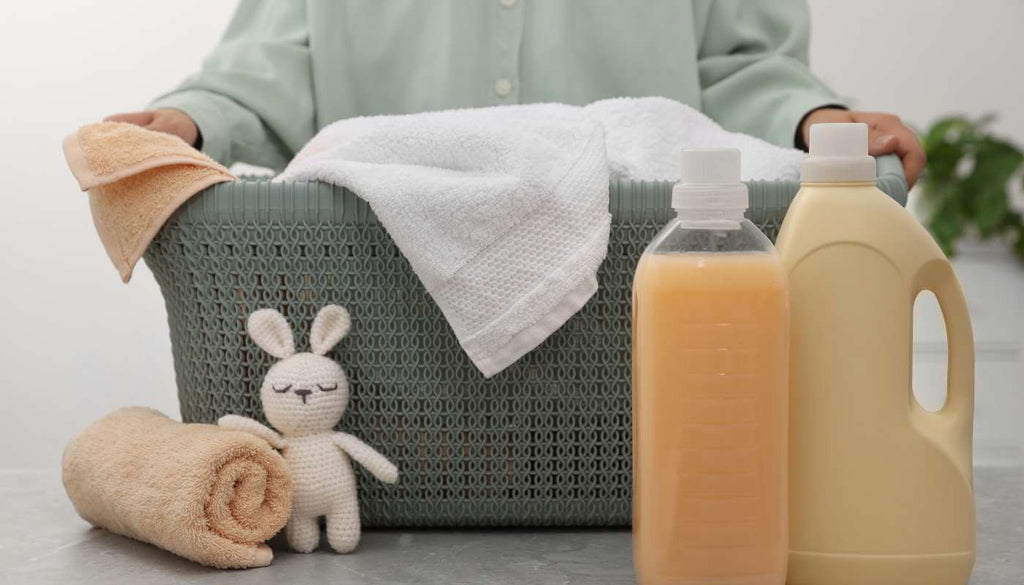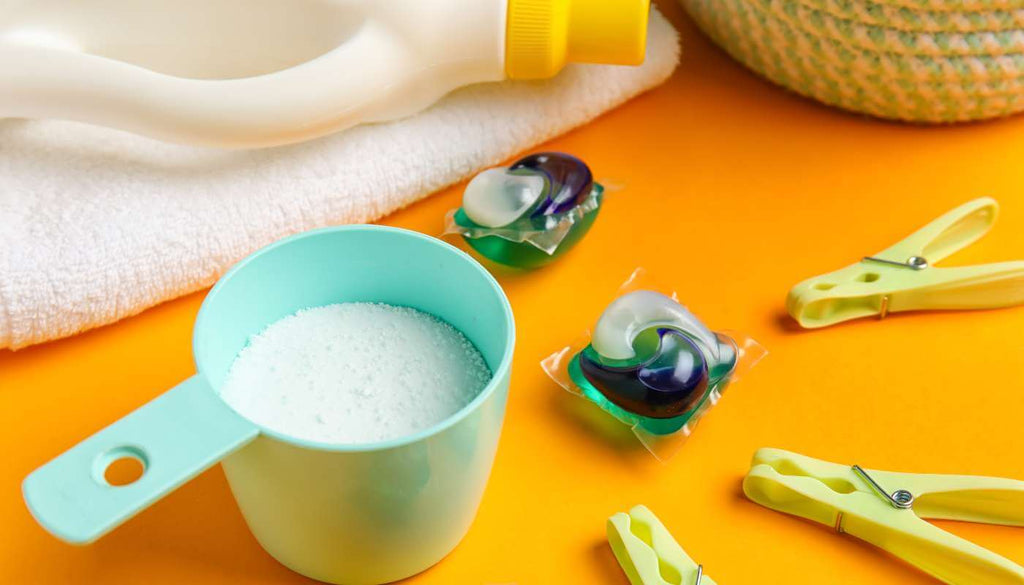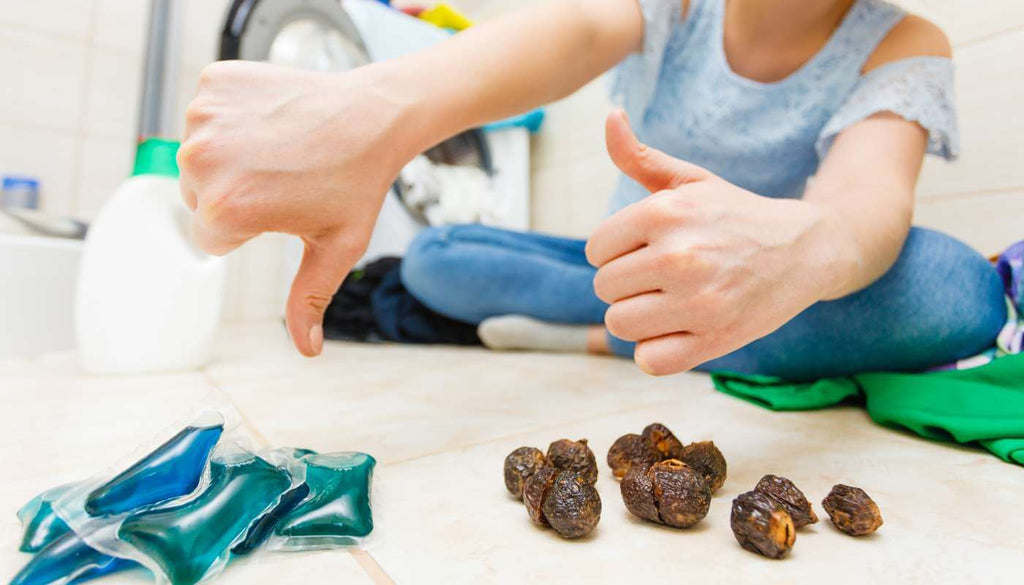
Best Baby Laundry Detergents: Everything You Need To Know
Babies are insanely cute, but they can get super dirty. And they sure do come with a ton of dirty laundry! Should you just use any laundry detergents when it comes to your baby's clothes?
Well, no. We'll tell you why, and let you know which are the best baby laundry detergents to use on your baby's clothes.
With baby clothes and nappies, you don’t want to use just any old laundry detergent. Babies are vulnerable to the toxic chemicals around them — and mainstream laundry detergents are particularly noxious. Many of the ones you find on store shelves are complex blends of harsh chemical ingredients that can cause problems for our health and on the environment.
When you use these products, you could be exposing your family to allergens, hormone disruptors, and possible carcinogens. Naturally, we don’t want that. So when it comes to baby laundry detergents, you might want to switch to a greener option.
Let’s take a quick look at why mainstream washing powders can be harmful to babies — and why you need to switch to natural laundry detergent. We’ll also give you tips on choosing the best baby laundry detergents out there. But first things first...

Do you need a separate baby laundry detergent?
Not really. Some families use two different detergents and do two separate washes — one for bub and one for the rest of the family. But even if you use a different detergent for his clothes, your baby will inevitably be exposed to the one you use for your own.
Laundry detergents can leave a film on clothing. Your baby will come into contact with this every time you snuggle or someone in the family picks him up. So instead of getting him his own baby laundry detergent, you might consider just getting a family friendly laundry product that's hypoallergenic and has fewer synthetic ingredients.
What to avoid when looking for baby laundry detergents?
Optical brighteners
These are chemicals that make colours appear brighter and whites whiter. They don’t actually get clothes any cleaner; they just create an optical illusion to mask yellowing and stains. Optical brighteners are designed to stick to fabrics, where they come in close contact with skin and could cause a reaction. These chemicals are slow to biodegrade and tend to build up in the environment, posing a potential hazard to aquatic life.
Synthetic fragrance
Added fragrances are one of the leading causes of sensitivity to laundry detergents. Manufacturers add these chemicals to laundry products because we’ve come to associate certain scents with clean laundry.
Unfortunately, 'fragrance' is a catch all term for thousands of potentially harmful chemicals, some of which are allergens, hormone disruptors, neurotoxins, and possible carcinogens. As consumers, we have no way of knowing what’s actually in 'fragrance' because that info is considered a trade secret. So steer clear of 'fragrance' and 'parfum.'
But remember: 'unscented' and 'fragrance free' are two different things. 'Unscented' means chemicals may have been used to mask or neutralise the smell of other ingredients. 'Fragrance free' means the product contains no fragrance or masking scents whatsoever. Sneaky!
Synthetic preservatives like methylisothiazolinone
Methylisothiazolinone is a powerful biocide (it kills microorganisms) that prevents laundry detergent from going bad. This chemical is a rising cause of allergic contact dermatitis in children and is linked with nerve cell damage.
Chlorine bleach
Bleach gets rid of stains and kills bacteria, but it’s highly irritating to the eyes, nose, and skin. When mixed with ammonia, it emits poisonous fumes. And when it combines with wastewater, it creates toxic organic compounds. You definitely don’t want this in a baby laundry detergent because even just passive exposure to it can increase your baby's risk of respiratory and other infections.
Phosphates and EDTA
Phosphates help soften water and remove dirt and grease from clothes. The problem with these chemicals is that they upset the balance in aquatic environments. Phosphates enhance algal growth, which robs fish and other aquatic species of oxygen. Because of this, phosphates have been banned for use in laundry detergents in the United States and the European Union. They’re still found in laundry products manufactured elsewhere, so you still want to watch out for them.
Some manufacturers have replaced phosphates with EDTA. This is another sneaky chemical that is toxic to animals and biodegrades poorly.

Dyes
Dyes serve no real purpose in laundry detergent but they do wear down the skin’s natural protective barrier and can make your skin dry and itchy.
We don’t have to subject our babies to these potentially harmful chemicals for the sake of having clean clothes. Look for baby washing powder or liquid with essential oils instead of synthetic fragrance, washing soda instead of phosphates and optical brighteners, and bicarb soda instead of bleach.
What to look for in baby laundry detergents?
The best baby laundry detergents have to be both good for baby and good for the environment. Of course, it also has to get the stickiest messes and nastiest odours out. Here’s what we’re looking for:
Safe ingredients
Go through the label and look out for the big ingredient no nos we've already discussed.
Tough on stains
Ultimately, if your washing powder can’t get stains and odours off your clothes, it’s useless. Natural laundry detergents have to be powerful enough to lift off common baby stains like milk spills, dribble, and mushy peas, as well as tougher messes (and unpleasant odours) from poop explosions.
Safe for cloth nappies
Baby laundry soap has to really get the gunk out without creating buildup on your cloth nappies, if you use them.
Kind to the planet
Go with laundry products that are biodegradable and grey water safe. Concentrated formulas are great because they save on packaging. Similarly, baby washing powder is better than liquid because you’re not wasting resources moving around what’s mostly just water.
With all the different options we have, trying to figure out which laundry detergents are safe for our families can take up a lot of time. We know you’re busy, so we’ve done the hard work.
Best baby laundry detergents
The good news is that it’s easier than ever to find a natural laundry detergent that hits all of the baby friendly requirements. Here are the ones we’ve found that really get the job done but don’t have harsh ingredients that can irritate sensitive baby skin.

Abode Laundry Liquid Baby
This hypoallergenic baby washing liquid uses soda ash to strip off dirt, grease, and other messes from bub’s clothes without harming your family or the environment. The stain busting liquid detergent is grey water safe, 100% biodegradable, and highly concentrated — a win for both the planet and your wallet.
Ecostore Laundry Soaker and Stain Remover
This super powerful detergent eliminates the toughest stains and destroys the foulest odours. Around here, we love how it brightens our clothes and has our whites positively gleaming! The ultra concentrated formula is very economical — up to 25 washes from the 1 kg bottle. It’s fragrance free and suitable for sensitive baby skin, which means you can feel good about using this on bub’s clothes.
That Red House Soapnuts
Soap nuts, or soapberries as they're also known, are a fruit that's naturally high in saponins. Saponins naturally release dirt and grime by reducing the surface tension of the water.
They're completely natural and organic, as well as fragrance free, so they're absolutely perfect for using on baby laundry.
Ready for clean, stain free onesies? Check out our best baby laundry detergents, soakers, and stain removers over at Natural laundry detergents at Hello Charlie.





